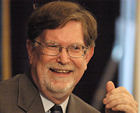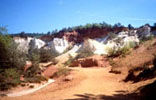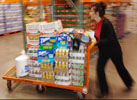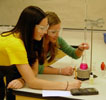


Berkeley Lab Nobel Laureate George Smoot has been appointed director of a new cosmology institute in South Korea that will work closely with the year-old Berkeley Center for Cosmological Physics (BCCP) at UC Berkeley to explore and understand the early universe. Last week, South Korea's Ministry of Education, Science, and Technology named Smoot a visiting scholar at Ewha (eee-hua) Womans University, a private university in Seoul where he will teach several courses over the next five years as he oversees the creation of the Institute for the Early Universe. More>
 Outreach: Iowa College Students Assist JGI With Microbial Genome Research Program
Outreach: Iowa College Students Assist JGI With Microbial Genome Research Program Biology students at Waldorf College in Iowa are joining students from 21 other colleges and universities in the United States who have been chosen to conduct research on behalf of the Department of Energy. This nation-wide initiative — called the Microbial Genome Annotation Research Program — is being coordinated by the Joint Genome Institute. The students will analyze and annotate genomes of various microorganisms, contributing to a worldwide online genome database that could potentially lead to advancements in pharmaceutical development. More>
 Lecture: The LSBB Underground Lab in Rustrel-Pays d'Apt, France
Lecture: The LSBB Underground Lab in Rustrel-Pays d'Apt, FranceStéphane Gaffet, the Director of the Laboratoire Souterrain à Bas Bruit (LSBB), or Low Noise Underground Laboratory) in France, will present a lecture on this facility on Monday at 2 p.m. in Building 90-1099. The laboratory was converted from a land-based missile-launch control center and is used to study metrology, measurements, and modeling activities, seismomagnetic coupling in unsaturated porous media, and applied physics. The lecture is sponsored by the Earth Sciences Division.
 Employee Activities: Discount COSTCO Memberships for Staff
Employee Activities: Discount COSTCO Memberships for Staff Lab staff interested in joining the COSTCO, a wholesale warehouse retailer, can stop by the cafeteria lobby between 11 a.m. and 2 p.m. on Monday to meet with a representative. Memberships will be offered to Lab employees at a discount.
 World of Science: International Science Exam Shows Plateau in U.S. Performance
World of Science: International Science Exam Shows Plateau in U.S. Performance [Washington Post] U.S. students are doing no better on an international science exam than they were a decade ago, a plateau in performance that leaves educators and policymakers worried about how schools are preparing students to compete in an increasingly global economy. Results of the Trends in International Mathematics and Science Study (TIMSS) show how fourth- and eighth-graders in the United States measure up to peers in dozens of countries. The students showed gains in math, but average science performance, although still stronger than in many countries, has stagnated since 1995. More>